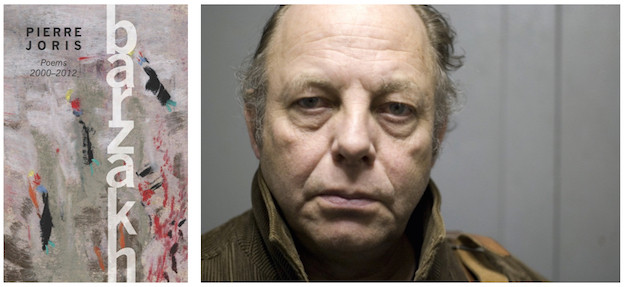Healer and hunter
A review of Pierre Joris's 'Barzakh'

Barzakh: Poems 2000–2012
Barzakh: Poems 2000–2012
My father was a healer & a hunter. Is it any surprise I became a poet & translator? (“Nimrod,” 121)
“Nothing truer than fragment” — I’m quoting Robert Kelly — & I love the coupling of “truth” which in our Western culture is always associated with the simple, the whole, the complete with the notion of the fragment, which can only be incomplete, multiple, partial so that the notion of a “true fragment” is de facto oxymoronic” (“Maintenant #94 — Pierre Joris: An interview with Pierre Joris by S. J. Fowler)
In identifying archetypally with healer and hunter, Pierre Joris brings his poems of the twenty-first century into an ever more fervid and restless search mode. Healers and hunters operate under the most severe time constraints, with survival at stake. Which is why Robert Kelly’s sage half-truth “Nothing truer than fragment” needs to be fleshed out. What Joris does with fragments, with increasing acuity decade after decade in his poems, is search and sift among fragments with urgent speed and decisiveness — nomad on the run — to shape fragments so they coalesce into culturally vibrant patterns of meaning. Think of Pound’s image of iron filings magnetized, constellated into an image of a rose. Like Pound, Joris finds fragments that move through his field of attention at high-velocity. Often from source to target language(s), faithful to his Luxemborgian-cum-American self whose oscillations in youth between German and French gave rise to his unsettling-settling home language of American English. Heard in the play of his ear and intellect, a true world music mix from a hydrogen jukebox in “A Poem in Noon”:
where our r, French,
rolls & roils
into the dark of a round
wonder, a drop in
a bucket, to re-emerge
hissing wet, somewhat
sheepish, but not ain
so difficult to pronounce
for northern claritas. (130)
Roaming among romance languages — hunting in the terra incognita of romance — Joris finds fragments of extraordinary resonance among the exiled: Dante (“This afternoon Dante”), Jabes (“Reading Edmond Jabes”), and Celan (“Shakespeare sonnet #71, re-Englished after Paul Celan’s German version without consulting the original”). Hunting for fragments among them, carrying them with him on his US-Maghreb transits — he shares with his beloved exiles an acute moral vision, sparks crystallizing fragments into a poem as a patterned integrity, as dynamically whirling as a Calder mobile, intently defining exilic hideaways, latently healing/reweaving a ripped social fabric. Set to music in this book’s finale working through news fragments of yet another leaking oil tanker catastrophe at sea, “The Gulf: From Rigwreck to Disaster”:
what we know is oil & water do not mix
what we know is fish & oil do not mix
what we know is you & I have to mix
what we know is you & I have to live (175)
Fragments add up and configure for Joris as he lives out the situation of poet as healer: diagnosing a pattern of systemic dehumanization under an anything-goes facade of technological progress. Yet the moral prophet stance that accelerated Pound’s madness is lightened in Joris through sensual destabilizing plays (riffs?) of intellect, or Beat-like goofy reveries on commonplace objects awash in new light, as in this jotting:
I like the imp
in impossibility
that makes it all
possible (228)
And in “In Praise of Pinot Blanc,” an ode evoking Gregory Corso’s wildness:
Oh, you natural clone of a
Red clone, you are a most
Sympathetic Frankenstein (229)
Which underscores that the working of every fragment found under the poet’s gaze is not elevated to an epic occasion. But what engages consistently in these poems of a dozen years is an acute handling of everyday experiences of a poet-scholar whose nomadic intelligence with fluid musical grace moves among cultures and languages penetratingly yet lightly. Accelerating the faculty of search with a hunter’s and healer’s urgency carries the risk of overreaching, particularly when Joris dances among transcontinental language and culture systems. What impresses throughout Barzakh is how Joris finds nourishment intellectually at last in the plenum of a hunter’s chase and a healer’s equipoise, experiencing his multiple languages and cultures as codes of shamanic ancestral guides:
is it tiring to chase language?
it is not
it is more tiring
to be chased by language.
there’s one on my left &
one on my right
I am comfortable in the middle
I like those that are by my side
to go through me. (175)
These literary ancestors in their various tongues moving through Joris inevitably draw a resounding pattern, a continuity through time, however carnivalesque and Babel-like, of moral witness through poetic artistry. In Pound’s “It does not cohere” the Cantos do exactly that. As Celan speaking through the magnificence of the Joris translation has it:
A roar: it is
truth itself
stepped among
mankind,
right into the
metaphor-flurry [1]
What makes the poetry of Pierre Joris most engrossingly nomadic may be the fact that the nomad’s sole home is constructed of his pressing propulsive hunting and healing songs. The Quran twice defines “barzakh” as a barrier separating salt water from fresh, suggesting a liminal zone where a soul after the body’s demise finds quiescence before its final infernal or blissful destination. Joris comprehends the tentative in-between nature of healing and hunting poetry. Senses a force-field between Orion and Chiron in the night sky constellating. And advances in his poems in spite of that precarious tragic focus. As the book’s final line paradoxically reminds: “DARK DISASTER CARRIES THE LIGHT” (297).
1. Paul Celan, Breathturn Into Timestead: The Collected Later Poetry, trans. Pierre Joris (New York: Farrar, Strauss and Giroux, 2003), 87.